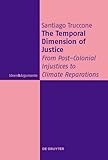The Temporal Dimension of Justice : From Post-Colonial Injustices to Climate Reparations / Santiago Truccone.
Material type: TextSeries: Ideen & ArgumentePublisher: Berlin ; Boston : De Gruyter, [2024]Copyright date: 2024Description: 1 online resource (XIII, 244 p.)Content type:
TextSeries: Ideen & ArgumentePublisher: Berlin ; Boston : De Gruyter, [2024]Copyright date: 2024Description: 1 online resource (XIII, 244 p.)Content type: - 9783111445816
- 9783111446370
- 9783111445946
- online - DeGruyter
- Issued also in print.
| Item type | Current library | Call number | URL | Status | Notes | Barcode | |
|---|---|---|---|---|---|---|---|
 eBook
eBook
|
Biblioteca "Angelicum" Pont. Univ. S.Tommaso d'Aquino Nuvola online | online - DeGruyter (Browse shelf(Opens below)) | Online access | Not for loan (Accesso limitato) | Accesso per gli utenti autorizzati / Access for authorized users | (dgr)9783111445946 |
Frontmatter -- Preface -- Contents -- Introduction: The Supersession of Historical Injustices -- Chapter 1 From Historical Injustices to Present Responsibilities -- Chapter 2 Political Sovereignty, the Principle of Proximity, and Institutional Reconciliation -- Chapter 3 Land, Distribution, and Corrective Justice -- Chapter 4 Climate Change and Intergenerational Justice -- Chapter 5 Climate Enrichment -- Chapter 6 International Justice and Climate Restitution -- Chapter 7 Climate Change and the Supersession Thesis -- Conclusion: The Temporal Dimension of Justice -- Bibliography -- Index
restricted access online access with authorization star
http://purl.org/coar/access_right/c_16ec
Should historical injustices always be repaired? Upon scrutinising public institutions and present holdings, it becomes evident that many are partially the result of past injustices. Consequently, the imperative to rectify and repair historical injustices emerges. However, as circumstances change over time and these changes affect justice, the argument for repairing historical injustices becomes more intricate. The distributive and reparative aspects of justice may be in tension with each other. Possible tensions between these aspects of justice are assessed by discussing the thesis about the supersession of historical injustices. Different facets of the supersession thesis are evaluated in two contexts. The first context, explored in the initial part of the book, examines whether and, if so, under what conditions, post-colonial injustices against 19th-century Latin American indigenous peoples should be repaired. The second context, explored later in the book, assesses how climate burdens should be distributed globally and how to respond to potential injustices arising from departures from a fair climate transition towards net-zero CO2 emissions societies. The book demonstrates that repairing historical injustices is compatible with the imperatives of distributive justice.
Issued also in print.
Mode of access: Internet via World Wide Web.
In English.
Description based on online resource; title from PDF title page (publisher's Web site, viewed 20. Nov 2024)


